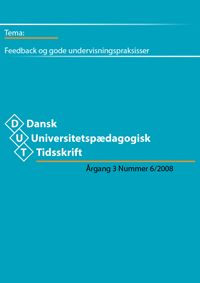Visual Interactive Syntax Learning: A Case of Blended Learning
DOI:
https://doi.org/10.7146/dut.v3i6.5607Resumé
The integration of the computer as a tool in language learningat the tertiary level brings several opportunities for adapting
to individual student needs, but lack of appropriate material suited for the level of student proficiency in Scandinavia has meant that university teachers have found it difficult to blend
the traditional approach with computer tools. This article will present one programme (VISL) which has been developed with the purpose of supporting and enhancing traditional instruction. Visual Interactive Syntax Learning (VISL) is a programme which is basically a parser put to pedagogical use. The pedagogical purpose is to teach English syntax to university students at an advanced level. The programme allows the students to build sophisticated tree diagrams of English
sentences with provisions for both functions and forms (simple or complex, incl. subclauses). VISL was initiated as an attempt to facilitate the metalinguistic learning process. This
article will present VISL as a pedagogical tool and tries to argue the case for the benefits of blending traditional lecturing with modern technology while pointing out some of the issues involved.
Downloads
Publiceret
Citation/Eksport
Nummer
Sektion
Licens
DUT udkommer elektronisk via Statsbibliotekets Open Journal System (Tidsskrift.dk) og DUNs hjemmeside (DUN-net.dk) forår og efterår. Det er gratis og frit tilgængeligt at læse og downloade artikler fra tidsskriftet.
Det er ikke muligt at abonnere på Dansk Universitetspædagogisk Tidsskrift, DUT, men hvis du er medlem af DUN, får du tilsendt en nyhedsmail med link til udgivelsen, når den nyeste udgave er online. Linket vil også være tilgængeligt her på siden, så snart tidsskriftet er publiceret.
© Copyright
Artikler publiseret i Dansk Universitetspædagogisk Tidsskrift, DUT, må bruges (downloades) og genbruges (distribueres, kopieres, citeres) til ikke-kommercielle formål med reference til forfattere og Dansk Universitetspædagogisk Tidsskrift.
Artikler indsendt til Dansk Universitetspædagogisk Tidsskrift må ikke publiseres i andre tidskrifter.
Betingelser
Artikler i Dansk Universitetspædagogisk Tidsskrift, DUT, er omfattet af ophavsretsloven, og der må citeres fra dem.
Følgende betingelser skal dog være opfyldt:
- Citatet skal være i overensstemmelse med „god skik“
- Der må kun citeres „i det omfang, som betinges af formålet“
- Ophavsmanden til teksten skal krediteres, og kilden skal angives ift. ovenstående bibliografiske oplysninger.





